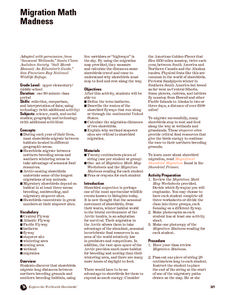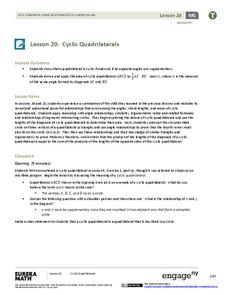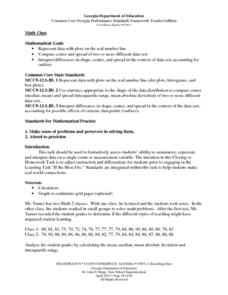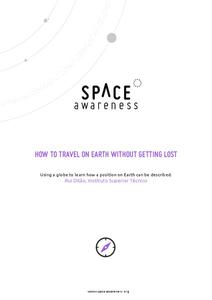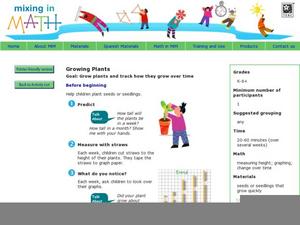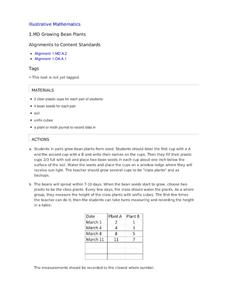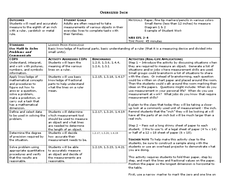Prince William Network
Migration Math Madness
A great way to incorporate math into life science, this lesson has learners measure migratory routes on a map and calculate the actual distance that shorebirds on the routes would cover. Learners compute the distance covered in both...
Curated OER
Pumpkin Play
Have you ever examined a pumpkin and estimated the number of lines it has? In this math lesson, students count the actual number of lines, record and graph the results. They investigate the circumference, weight and buoyancy of the...
PBS
Garden Grade 6 Area and Perimeter
Engage young mathematicians in applying their knowledge of area and perimeter with a fun geometry lesson. Through a series of problem solving exercises, children use their math knowledge to design different-sized garden plots that meet...
Virginia Department of Education
Analyzing and Interpreting Statistics
Use measures of variance to compare and analyze data sets. Pupils match histograms of data sets to their respective statistical measures. They then use calculated statistics to further analyze groups of data and use the results to make...
EngageNY
Cyclic Quadrilaterals
What does it mean for a quadrilateral to be cyclic? Mathematicians first learn what it means for a quadrilateral to be cyclic. They then investigate angle measures and area in such a quadrilateral.
Georgia Department of Education
Math Class
Young analysts use real (provided) data from a class's test scores to practice using statistical tools. Not only do learners calculate measures of center and spread (including mean, median, deviation, and IQ range), but also use this...
Illustrative Mathematics
Running on the Football Field
Make your class into Pythagorean theorem fanatics in no time. What a great resource to get your sports enthusiasts into the math game! Read the commentary so you can you can strategize how to apply the three math practices.
Space Awareness
How To Travel On Earth Without Getting Lost
Have you ever wanted to travel the world? Take a virtual trip with a geography lesson that uses longitude and latitude, the position of the sun, an astronomy app, and a classroom globe.
Curated OER
New Ways to Measure
Students recognize that measuring tools can come in many different shapes and sizes. In this early childhood math lesson plan, students develop creative-thinking, math, and social skills as they use nontraditional measuring tools.
Curated OER
Is That Measurement Stuff For Real, Life?
Fifth and sixth graders engage in a series of activities which show them the importance of using different types of measurement strategies. One of the primary goals of the lesson is to show learners that measurement is helpful in many...
Curated OER
The Circle's Measure
Listen to the story "Sir Cumference and the Dragon of Pi" and solve the riddle and to save Sir Cumference from the knights. Your students will love mixing an activity with story and will practice their measuring skills while completing...
University of Wisconsin
Measuring Slope for Rain Gardens
The slope of the land is an important feature when considering the erosion that will occur. In this resource, which is part of a rain garden unit, learners calculate the slope of the proposed garden site. Even if you are not planning a...
Mixing In Math
Mixing in Math: Growing Plants
Whether you have your class plant seeds or begin when sprouts are visible, math skills are used here to predict and track growth over time. Straw bar graphs show plant height on a given day while the graph as a whole shows changes over...
Curated OER
Measure: Bearings and Scale Drawings
Young mathematicians practice measuring acurately with a protractor. They convert measurements using a scale factor, then translate the new information into diagrams. This lesson should be a hit in that it's mostly hands-on work with the...
Curated OER
Get Me to the Premiere on Time
Students discover how to calculate speed, distance, and rate. In this problem solving lesson, students view an episode of "Cyberchase" and use the distance formula to determine the fastest route that the main character in the episode...
Curated OER
Lesson 3: Measuring Angles
Students use a protractor to measure angles. They classify angles by type: right angle, acute angles, and obtuse angles. Students build and draw right, acute, and obtuse angles. They discuss how do people in various professions use...
Curated OER
Industrialization, Chemicals and Human Health - Math
Students review the units of the metric system, and practice estimating measures before actually converting between the two systems of measurement. They participate in activities to visualize a concentration of one part per million....
Illustrative Mathematics
Growing Bean Plants
Plant growth experiments offer rich, cross-curricular learning opportunities that can really excite and engage young learners. In this series, children work in pairs planting, measuring, and comparing the height of bean plants in order...
Curated OER
Measuring Pumpkins and Our World
Students estimate the circumference of a pumpkin. They measure the pumpkin and other school objects, and record the measurements on worksheets.
Curated OER
Oversized Inc
Fourth graders become familiar with fractional parts of a ruler. In this measurement lesson, 4th graders measure various objects to an 1/8 of an inch. Students measure a piece of paper based on teacher direction. Students discuss the...
Illustrative Mathematics
How Long
It won't take young mathematicians long to learn how to measure length with this fun, hands-on activity. Working in pairs, children use Unifix® or snap cubes to measure and record the lengths of different classroom objects. To extend the...
TryEngineering
What is a Nanometer?
Exactly how small is a nanometer? Scholars investigate the scale of a nanometer by measuring classroom objects and converting these measurements to nanometers.
Curated OER
Math Activity File
Third graders describe the difference between area and volume and also explain how various units of measure relate to one another.
Curated OER
Marshmallow Fun Day - math
Early learners rotate to different classroom centers and participate in six activities based on using marshmallows to review concepts learned. They make: marshmallow sculptures (geometric shapes), the shape of mittens using colored...


